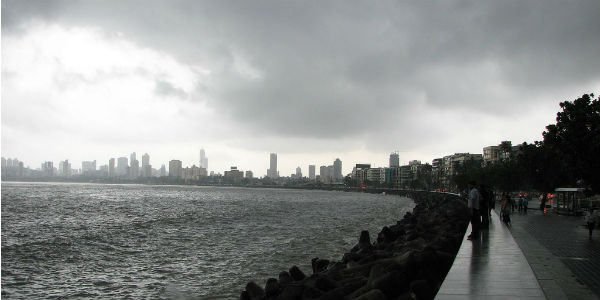 It seems that the long wait for the Monsoon in Mumbai is finally coming to an end. As the Monsoon 2017 inches closer to the coastal city, pre-Monsoon rains are likely to intensify significantly over Mumbai.
It seems that the long wait for the Monsoon in Mumbai is finally coming to an end. As the Monsoon 2017 inches closer to the coastal city, pre-Monsoon rains are likely to intensify significantly over Mumbai.
According to Skymet Weather, rains are now all set to pick up pace June 8 onwards. This will be a prolonged wet spell which is likely to extend till June 13. Not only this, these rains will also be responsible for the onset of Monsoon over Mumbai in the next 2-3 days.
The entertainment capital has already been recording light rain for last couple of days. In span of 24 hours from 8:30 am on Wednesday, Colaba Observatory has recorded 28 mm of rain, while Santa Cruz Observatory received 12 mm.
[yuzo_related]
Now, a fresh cyclonic circulation is likely to form over Northeast Arabian Sea, close to Mumbai. The system is likely to get more marked gradually, strengthening the southwesterly winds along the coast.
 Check the live status of lightning and rain across Mumbai
Check the live status of lightning and rain across Mumbai
In wake of this, moderate rainfall will continue over Mumbai, with heavy rains also likely in some parts of the city. From June 9, moderate to heavy rains will commence over the state capital.
So far, the city has recorded mere 19.7 mm of rain as compared to its mammoth monthly average rainfall of 523 mm. However, Mumbai
is famous for three-digit rainfall during this season. Hence, with over 22 days in hand, surpassing this huge target will not be surprising.
Mumbai records 96% of rains during Southwest Monsoon
Every year, Mumbai eagerly awaits the Southwest Monsoon. No wonder, the city remains mainly dry throughout the year and this is season wherein Rain Gods open their hearts for Mumbaikars.
The four-month long Monsoon season that spans from June till September is the rainiest period for the city in the year. Mumbai records total of 2165 mm of rain in these four months itself, accounting to 96 % of the annual rainfall of 2258 mm.
To be precise, July is the rainiest month with monthly average of 800 mm of rains, followed by June and August at 523.1 mm and 529.7 mm, respectively.
Image credit: ToI
Any information taken from here should be credited to skymetweather.com


